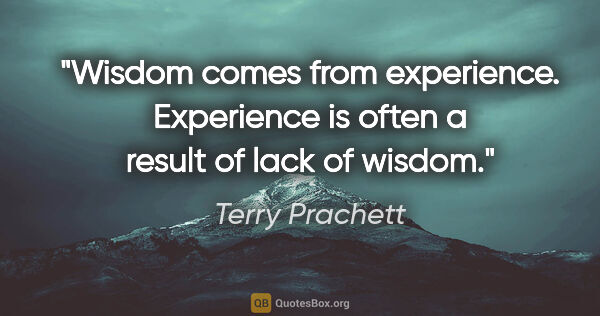Result Quotes (page 26)

Men speak of dreaming as if it were a phenomenon of night and sleep. They should know better. All results achieved by us are self-promised, and all self-promises are made in dreams awake. Dreaming is the relief of labor, the wine that sustains us in act. We learn to love labor, not for itself, but for the opportunity it furnishes for dreaming, which is the great under-monotone of real life, unheard, unnoticed, because of its constancy. Living is dreaming. Only in the graves are there no dreams.
Lew Wallace
So much for Objective Journalism. Don't bother to look for it here--not under any byline of mine; or anyone else I can think of. With the possible exception of things like box scores, race results, and stock market tabulations, there is no such thing as Objective Journalism. The phrase itself is a pompous contradiction in terms.
Hunter S. Thompson
O me! O life!... of the questions of these recurring;
Of the endless trains of the faithless—of cities fill’d with the foolish;
Of myself forever reproaching myself, (for who more foolish than I, and who more faithless?)
Of eyes that vainly crave the light—of the objects mean—of the struggle ever renew’d;
Of the poor results of all—of the plodding and sordid crowds I see around me;
Of the empty and useless years of the rest—with the rest me intertwined;
The question, O me! so sad,...
Walt Whitman
The world says: "You have needs -- satisfy them. You have as much right as the rich and the mighty. Don't hesitate to satisfy your needs; indeed, expand your needs and demand more." This is the worldly doctrine of today. And they believe that this is freedom. The result for the rich is isolation and suicide, for the poor, envy and murder.
Fyodor Dostoevsky
The mind in creation is as a fading coal, which some invisible influence, like an inconstant wind, awakens to transitory brightness; this power arises from within...could this influence be durable in its original purity and force, it is impossible to predict the greatness of the result; but when composition begins, inspiration is already on the decline; and the most glorious poetry that has been communicated to the world is probably a feeble shadow of the original conceptions of the poet.
Percy Bysshe Shelley
Between ourselves and our real natures we interpose that wax figure of idealizations and selections which we call our character. We extend this into all our thinking. Between us and the realities of social life we build up a mass of generalizations, abstract ideas, ancient glories, and personal wishes. They simplify and soften experience. It is so much easier to talk of poverty than to think of the poor, to argue the rights of capital than to see its results. Pretty soon we come to think of...
Walter Lippmann
We have to start from the ground up and reconsider what education is. In my language, I'd like to see us educate the soul, and not just the mind. The result would be a person who could be in the world creatively, make good friendships, live in a place he loved, do work that is rewarding, and make a contribution to the community. People say that the word "educate" means to "draw out" a person's potential. But I like the "duc" - part in the middle of it. To be educated is to become a duke, a...
Thomas Moore
There are two ways of being happy: We may either diminish our wants or augment our means- either will do- the result in the same; and it is for each man to decide for himself, and do that which happens to be the easiest. If you are idle or sick or poor, however hard it may be to diminish your wants, it will be harder to augment your means. If you are active and prosperous or young and in good health, it may be easier for you to augment your means than to diminish your wants. But if you are...
Benjamin Franklin
Physiologists should think before putting down the instinct of self-preservation as the cardinal instinct of an organic being. A living thing seeks above all to discharge its strength--life itself is will to power; self-preservation is only one of the indirect and most frequent results.
Friedrich Nietzsche
It was a masterly piece of work. But once you began admitting explanations in terms of purpose— well, you didn't know what the result might be. It was the sort of idea that might easily decondition the more unsettled minds among the higher castes—make them lose their faith in happiness as the Sovereign Good and take to believing, instead, that the goal was somewhere beyond, somewhere outside the present human sphere; that the purpose of life was not the maintenance of well-being, but some...
Aldous Huxley
